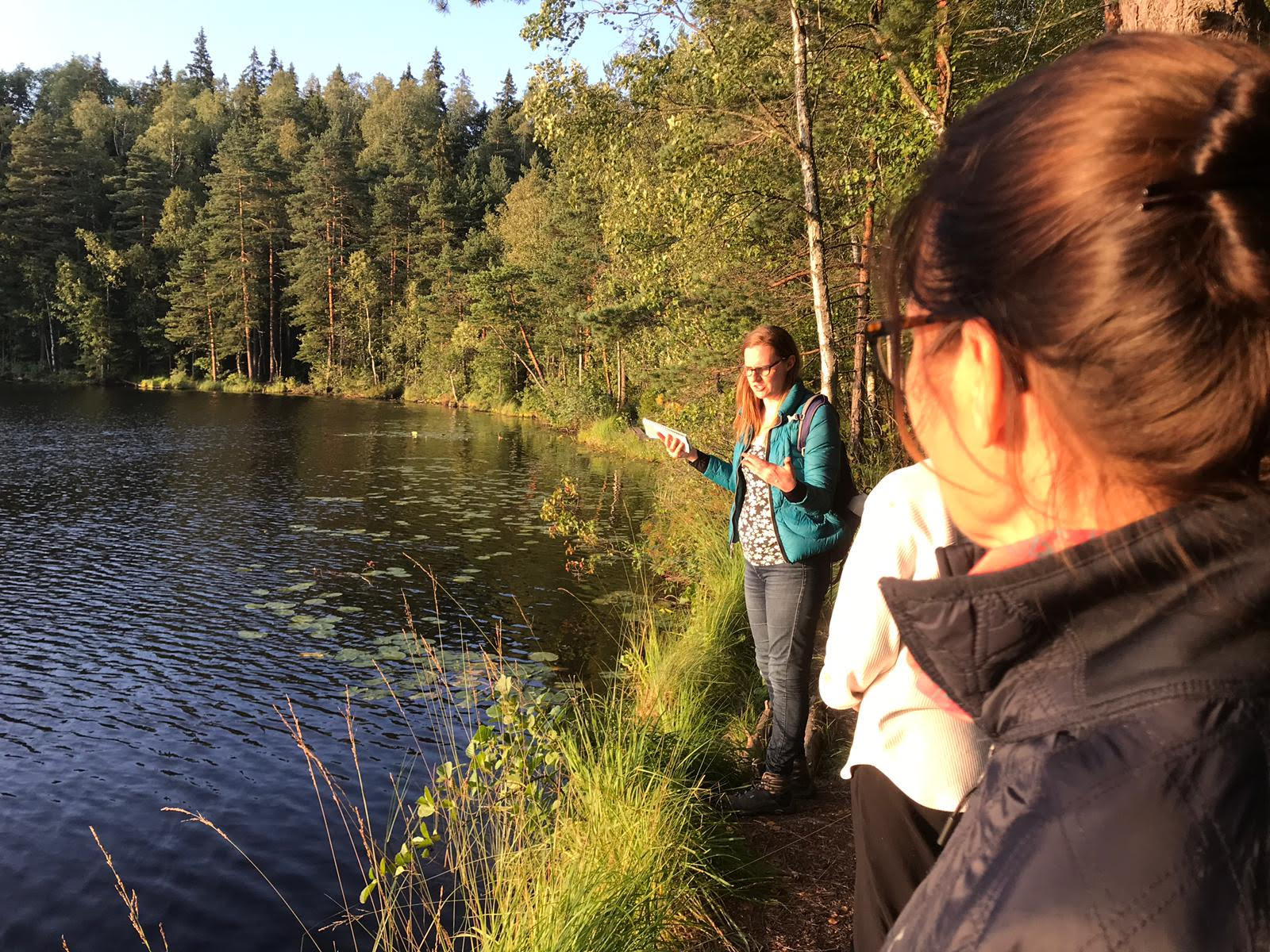Forest Bathing for Attorney Well-Being
By Brooke Mellen, Founder of Cultured Forest

Five years ago I hiked the Arden Point and Glenclyffe trail north of New York City along the Hudson with a friend to immerse myself in nature. I mentioned to my hiking buddy that one day I would like to lead mindfulness walks in nature. To this day I believe that sharing ideas outdoors with a supportive friend is not unlike planting seeds for future goals in hopes that they will sprout.
At the time of this conversation I was working as a claims adjuster investigating and settling fine art and jewelry claims for a major insurer. Before this I was the Risk Manager at Sotheby’s Auction House where I was responsible for insuring and protecting over 2 Billion USD in fine art assets. While some might think these roles glamorous, they were not without their stresses. I’ve always known intuitively that I simply feel better spending time outdoors. I’m an avid hiker and nature lover, having solo traveled to locales such as Iceland, Peru, the Amazon and Galapagos. So I often found stress relief in these high demand roles by spending time in nature.
Months after mentioning this interest in walking meditation, while wandering around the lower east side of New York City, I found the book “Forest Bathing” by Qing Li at a local shop. I read about the studies behind how engaging the senses in nature reduces stress, but even further found something inspiring in the photos of the Forests of Japan. He spoke of the Hinoki Cypress trees, and I wanted to experience them in person. So I eventually traveled to Japan, earned a certificate in Forest Medicine with Dr. Li and started a personal Forest Therapy practice. I started a company called Cultured Forest to inspire others to find mindfulness in the same way I did through art and nature connection. I now advise and guide organizations, individuals and legal professionals around the importance of incorporating biodiversity and nature into collective well-being practices as a form of risk management.
At the end of this article I have included a Nature Connection goal-setting worksheet to motivate lawyers to connect with nature for well-being.
What is Forest Bathing & What are the Benefits?
In the 1980’s Japan faced a public health crisis related to burnout of workers in densely populated cities. In response, the Japanese Ministry of Agriculture, Forestry, and Fisheries developed a public health program called “Shinrin-Yoku.” It translates to “Forest Bathing” or “Taking in the Forest Atmosphere.” It is a prescribed program where participants can go to a dedicated Shinrin-Yoku trail and meet with a doctor or nurse certified in Forest Medicine who tests various health markers and mood states before and after their Forest Bathing session.
The Japanese Society of Forest Medicine was established in 2007 with the purpose of promoting research in the field of forest medicine. The Japanese medical community conducted a myriad of studies, and among their most interesting findings was that spending time mindfully connecting with Nature leads to marked improvement in physiological and mental health. Specifically, “forest environments promote lower concentrations of cortisol, lower pulse rate, lower blood pressure, greater parasympathetic nerve activity, and lower sympathetic nerve activity than do city environments.” (1)
Japanese researchers also found that a 3 day/2 night trip to the forest contributed to increased natural killer cells (NK), thereby improving immunity. Additionally, phytoncides, (a chemical produced by many plants to ward off pests and disease) have also been shown to increase this NK cell activity.(2)
Interestingly, during the Covid Pandemic two major US medical institutions wrote about the benefits of Forest Therapy as a way to cope. Harvard Medical said:
The pull toward the natural world is present even in normal times. Now, as we’re confined indoors by the coronavirus pandemic, often spending hours in front of inanimate screens, the urge to be outside is ever more acute. One way to satisfy these urges while improving our health and well-being is forest therapy, a practice growing in popularity around the world.(3)
The Cleveland Clinic also published a blog post during the pandemic discussing the benefits of Forest Bathing. The article discusses the benefits to both the mind and body and says:
Common sense says that taking in the sights and sounds of the forest can help you relax. But it’s not just our brains that get a boost. There’s evidence that forest therapy is good for our bodies, too.(4)
The research from Japan with endorsement by major medical institutions in the US makes a compelling case for spending time in nature for well-being. For those in the legal industry who are in high stress jobs this is especially true.
The Benefits of Biophilic Design
Bringing nature indoors through biophilic design is another option to connect with nature for those who work indoors, including in legal offices. A study in Japan looked at reactions to nature sensory experiences indoors on participant’s physiological health. Researchers displayed a “Shinrin-yoku” photo of people walking in a French forest, and viewing this scene participants experienced significantly decreased blood pressure and improved prefrontal activity versus those looking at a grey screen.(5) This same paper also reviews a Japanese study where participants inhaled Taiwan cypress essential oil indoors, which relaxed subjects and helped them focus better on tasks.(6)
The University of Michigan conducted a study that looked at the effect of viewing images of nature versus images of urban areas on cognitive function, and it found that simple and brief interactions with nature can produce marked increases in cognitive control.(7)
Conclusion
As discussed, the benefits of connecting with nature both indoors and in outdoor spaces are well researched. Putting Forest Bathing into practice might seem as simple as going outside for a walk, and in many ways it is that easy. However, intentionally spending time in nature for well-being creates opportunities for self-care and community building among participants, including attorneys.
Here is a simple Nature Connection goal setting guide for attorneys to enjoy some of the benefits of connecting with nature both in their offices and outside.
- https://pubmed.ncbi.nlm.nih.gov/19568835/
- https://europepmc.org/article/med/16873099 11https://www.health.harvard.edu/blog/can-forest-therapy-enhance-health-and-well-being-2020052919948
- https://www.health.harvard.edu/blog/can-forest-therapy-enhance-health-and-well-being-2020052919948
- https://health.clevelandclinic.org/why-forest-therapy-can-be-good-for-your-body-and-mind/
- https://www.ncbi.nlm.nih.gov/pmc/articles/PMC2793347/
- https://www.ncbi.nlm.nih.gov/pmc/articles/PMC2793347/
- https://researchgate.net/publication 23718837_The_Cognitive_Benefits_of_Interacting_With_Nature

